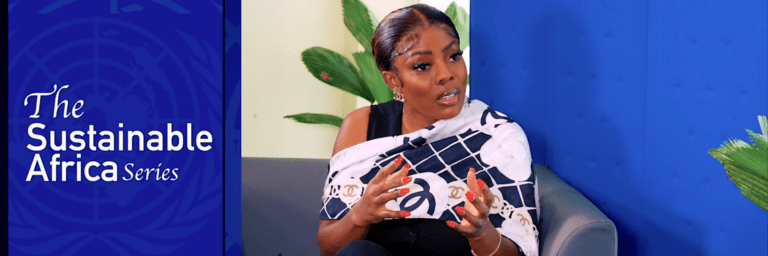In Ghana’s vibrant media landscape, Nana Aba Anamoah, stands out not just for her on-screen presence, but for her relentless commitment to social justice and advocacy.
As General Manager of GHOne TV, Nana has emerged as a leading advocate for gender equality, health reform, and youth empowerment, transforming from a celebrated media personality into a dynamic agent of change and an influential voice in Ghana.
Anamoah spoke during an interview for the Sustainable Africa Series, a production by the United Nations Economic Commission for Africa, focusing on how African celebrities and personalities utilize their platforms to uplift humanity and advance the Sustainable Development Goals.
Anamoah’s journey into journalism began with a childhood fascination with television, fueled by her father’s love for news and shows like Larry King Live.
“My father introduced me to Larry King Live at a very young age,” she recalled. “By the time I was nine, I knew I wanted to be on TV – not just to be seen, but to make a difference.”
This desire to make a difference has driven Nana to tackle some of Ghana’s most pressing social issues. Among her most impactful efforts is her advocacy for kidney disease patients, many of whom struggle to afford life-saving dialysis treatments.
“I received a letter from a group of patients who couldn’t afford the treatment, and I knew I had to do something,” said Nana. She mobilized resources and raised awareness, not just to fund treatments but also to highlight the systemic discrimination these patients face in the workplace.
“It’s not just about raising money – it’s about changing the policies that allow this kind of injustice to continue.”
Her commitment to health advocacy extends to her fight against the misuse of drugs that have wreaked havoc in Ghanaian communities. Through her reporting, Nana and her team exposed the widespread abuse, particularly among young people. This led to the establishment of Ghana’s first national addiction center.
“Seeing the extent of the problem was shocking,” she said. “But it was even more rewarding to see real action being taken to address it.”
Nana also played a key role in the successful separation of conjoined twins in Ghana, using her platform to raise awareness and mobilize resources for the life-saving surgery.
Gender equality is another area where Anamoah has made significant strides. At GHOne TV, she has prioritized the promotion of women into leadership positions, ensuring that they are well-represented in the newsroom and beyond.
“When I became General Manager, one of my main goals was to ensure that women had more opportunities to lead,” said Nana. “These women have proven that they are not just capable – they excel.”
Her commitment to inclusion also extends to individuals with disabilities. Anamoah has been instrumental in bringing persons with disabilities into the newsroom, believing that their voices are crucial for balanced reporting.
“We often tell the stories of people with disabilities without truly understanding their experiences,” she noted. “By having them in the newsroom, we ensure their stories are told with authenticity and empathy.”
Nana’s passion for empowering women led her to create the “Women of Valor” platform, which brings together women from across Africa annually to share their experiences and find solutions to the challenges they face.
Nana’s passion for empowering women inspired her to create the ‘Women of Valor’ platform, which brings together women from across Africa each year to share their experiences and find solutions to the challenges they face.
“One of the most powerful moments was when a young woman shared her story of surviving sexual abuse by her father,” said Nana. “Her courage inspired others to come forward, and it reminded me of the strength and resilience of women everywhere.”
With millions of followers across various social media platforms, Nana Aba Anamoah has leveraged her influence to inspire change and amplify the voices of the marginalized.
Her tireless work in advocating for health, combating drug abuse, and promoting women’s leadership continues to drive progress in Ghana.
“I’ve always wanted to do something that matters, something that will outlive me,” she noted. “I believe that’s exactly what we’re doing.”
Nana expressed hope that world leaders meeting in New York this September for the Summit of the Future will prioritize the issue of gender inequality in their discussions.
“If we truly want a better future, we have to start by making sure everyone has a seat at the table – especially women,” she added.
GIK/APA


